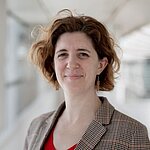
Health, energy and sustainable environment
Teaching and research department
The Health, energy and sustainable environment department covers a wide range of skills in research and teaching and in such diverse fields as civil engineering, digital health and energy. The department’s approach is centred around interdisciplinarity to provide a comprehensive response to the challenges of the energy transition, technology for health and sustainable cities, while encompassing regulatory, societal, ethical and environmental issues.
The department coordinates the physics classes in undergraduate courses, two initial engineering courses and two work-study engineering courses.
Areas of expertise
- Power generation systems and renewable energy
- Energy efficiency of buildings and facilities
- Biomedical applications
- Data and AI in healthcare
- Connected health systems
- Structural calculations, building shells, façades and roofs
Research areas
- Sensors and microsystems for healthcare, the environment and sustainable cities
- Healthcare decision support
- Signal and data processing for energy and healthcare
- Micro-devices and nanostructured materials for energy recovery
- Energy systems for sustainable cities
- Multi-scale modelling of homogeneous structures and materials
- Quantifying uncertainties in the mechanics and dynamics of structures and coupled systems; Numerical simulation of convective mass and energy transfers
Study programmes
Partnership
Industrial
Schlumberger, Obelia, MISTIC, Engie, ENVEA, Erganeo, Efficacity, Axorus, EIG, Mobydi and HandyLight
Academic
IDV, CEA LIST, LIRMM, INCIA, IMS, LIP6, LISIS, CSTB, LIED, CERTES, UPEC, MSME, ISITE Future, EMGCU, LRMH, ENVA, IMRB, LIMICS, AP-HP, ICAN
Contact

